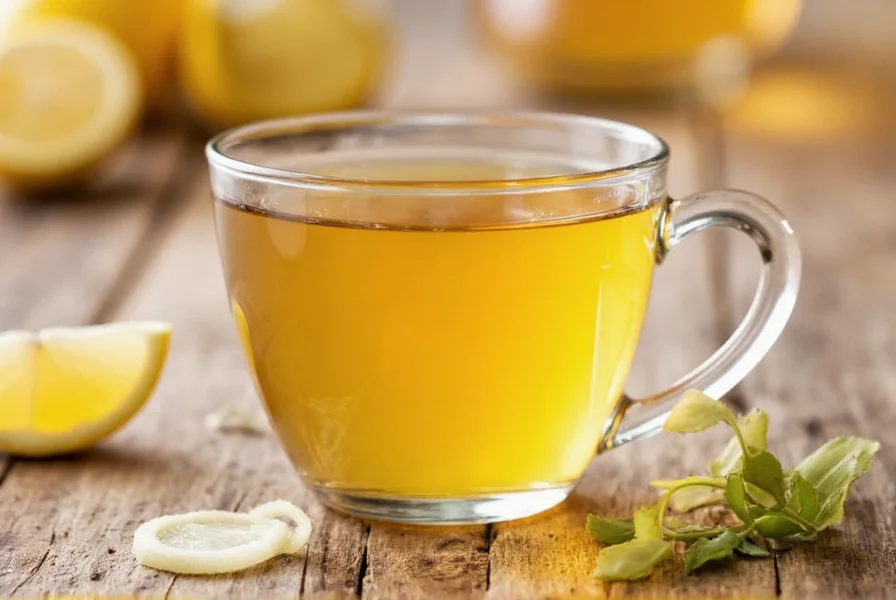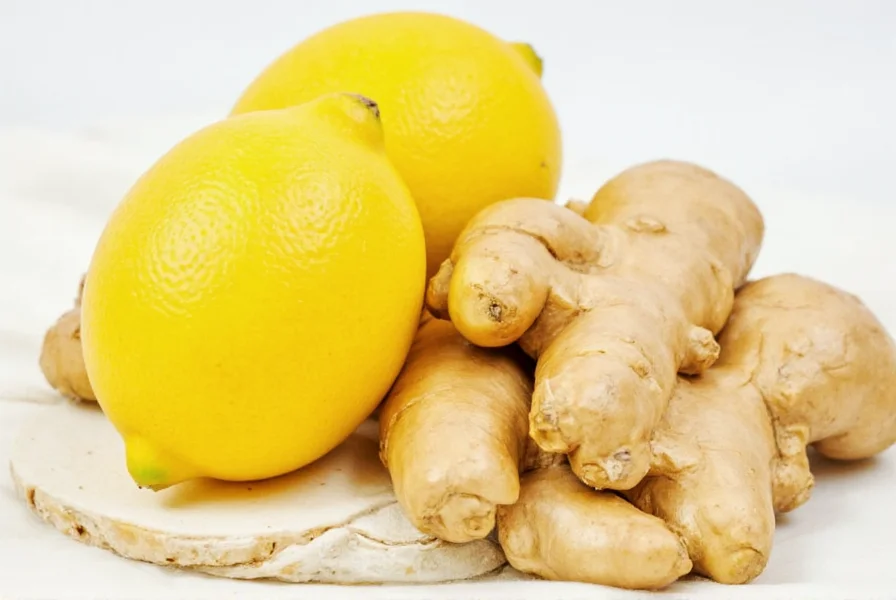For centuries, cultures worldwide have turned to ginger lemon tea as a natural remedy for various ailments. This simple combination of two powerful ingredients creates a synergistic beverage with multiple health advantages backed by modern research. Unlike many trendy 'superfood' claims, the benefits of ginger lemon tea have substantial scientific support, particularly for digestive health and immune support.
The Science-Backed Health Benefits of Ginger Lemon Tea
Ginger and lemon each bring unique compounds that work together to create a potent health beverage. Ginger contains gingerols and shogaols, bioactive compounds responsible for its therapeutic effects. Lemon contributes vitamin C, citric acid, and flavonoids that enhance the overall health profile of this tea.
Digestive Health Support
Ginger lemon tea ranks among the most effective natural remedies for digestive issues. Multiple clinical trials confirm ginger's ability to accelerate gastric emptying and reduce nausea. A 2020 meta-analysis published in Nutrients found ginger significantly reduced symptoms of functional dyspepsia. The combination with lemon's citric acid creates an ideal environment for digestive enzymes to function properly.
| Benefit | Key Compounds | Scientific Support Level |
|---|---|---|
| Digestive improvement | Gingerols, shogaols | High (multiple clinical trials) |
| Nausea reduction | Gingerols | High (FDA-recognized) |
| Immune support | Vitamin C, flavonoids | Moderate (observational studies) |
| Anti-inflammatory effects | 6-gingerol, limonene | Moderate (in vitro and animal studies) |
Immune System Enhancement
The vitamin C in lemon works synergistically with ginger's bioactive compounds to support immune function. While lemon alone provides about 18.6mg of vitamin C per 100g (approximately 20% of daily needs), the combination with ginger creates a more potent immune-supporting beverage than either ingredient alone. Research in the Journal of Medicinal Food indicates ginger's compounds may enhance immune cell activity, though more human studies are needed.
Natural Anti-Inflammatory Properties
Ginger's 6-gingerol inhibits inflammatory pathways in the body, similar to some non-steroidal anti-inflammatory drugs but without the side effects. A 2019 review in Antioxidants concluded that ginger supplementation significantly reduced markers of inflammation in clinical trials. Lemon's limonene and other flavonoids complement these effects, making this tea particularly valuable for managing chronic inflammation.
Antioxidant Protection
Both ingredients contribute powerful antioxidants that combat oxidative stress. Ginger contains 10-20 times more antioxidants than many common vegetables, while lemon provides hesperidin and diosmin. These compounds work together to neutralize free radicals, potentially reducing cellular damage associated with aging and chronic diseases.
Hydration and Metabolism Support
As a caffeine-free beverage, ginger lemon tea provides excellent hydration while potentially supporting metabolic health. The thermogenic effect of ginger may slightly increase calorie expenditure, while lemon's citric acid supports healthy metabolism. A study in Metabolism found ginger supplementation associated with modest reductions in body weight and waist-to-hip ratio.
Preparing Ginger Lemon Tea for Maximum Benefits
To maximize the health benefits, use fresh ingredients and proper preparation techniques:
- Use 1-2 inches of fresh ginger root, thinly sliced or grated
- Steep in boiling water for 10-15 minutes (longer steeping releases more gingerols)
- Add the juice of half a lemon after the tea has cooled slightly (above 60°C/140°F degrades vitamin C)
- Consider adding a small amount of black pepper to enhance absorption of ginger compounds
- Avoid adding excessive sugar which counteracts health benefits

Potential Side Effects and Precautions
While generally safe, ginger lemon tea may cause issues for some individuals:
- Ginger may interact with blood-thinning medications like warfarin
- Excessive consumption (more than 4 grams of ginger daily) may cause heartburn or mouth irritation
- Lemon's acidity may erode tooth enamel with frequent consumption
- Pregnant women should limit ginger intake to 1 gram daily without medical supervision
- Those with gallstones should consult a physician before regular consumption
Comparing Ginger Lemon Tea to Other Herbal Remedies
Unlike many herbal teas that offer primarily hydration benefits, ginger lemon tea provides measurable physiological effects. While chamomile tea mainly supports relaxation and peppermint tea focuses on digestive relief, ginger lemon tea delivers a broader spectrum of benefits. Its advantage over commercial digestive aids is the absence of artificial ingredients and minimal side effects when consumed appropriately.
For optimal results, incorporate ginger lemon tea into a balanced wellness routine rather than viewing it as a standalone solution. Regular consumption (1-2 cups daily) shows the most consistent benefits according to clinical observations.
Conclusion: A Time-Tested Remedy with Modern Validation
Ginger lemon tea represents a perfect intersection of traditional wisdom and modern science. Its benefits for digestion, inflammation reduction, and immune support are among the most well-documented of any herbal remedy. While not a cure-all, this simple beverage offers significant health advantages with minimal risk when consumed as part of a balanced lifestyle. The growing body of research continues to validate what traditional medicine practitioners have known for centuries about this powerful natural combination.
Frequently Asked Questions
How often should I drink ginger lemon tea for optimal benefits?
For digestive support, 1-2 cups daily, preferably before meals. For general wellness, one cup in the morning provides sufficient benefits without potential side effects. Clinical studies showing positive effects typically used equivalent of 1-2 grams of ginger daily, which translates to approximately one cup of properly prepared tea.
Can ginger lemon tea help with weight loss?
Ginger lemon tea may support weight management efforts but isn't a standalone solution. Research in Metabolism journal found ginger supplementation associated with modest reductions in body weight and waist-to-hip ratio. The tea promotes hydration, may slightly increase metabolism through ginger's thermogenic properties, and can reduce cravings when consumed before meals. However, significant weight loss requires comprehensive dietary and lifestyle changes.
When is the best time to drink ginger lemon tea?
Morning consumption provides an immune-boosting start to the day and supports digestion throughout waking hours. Before meals (15-30 minutes prior) optimizes digestive benefits. Avoid drinking large quantities close to bedtime as ginger may cause mild stimulation in some individuals. For nausea relief, consume at the first sign of symptoms.
Does ginger lemon tea really boost immunity?
Ginger lemon tea supports immune function through multiple mechanisms. Lemon provides vitamin C which is essential for immune cell function, while ginger contains compounds that may enhance immune response. A 2020 review in Journal of Immunology Research noted ginger's immunomodulatory effects. However, it's not a substitute for vaccines or medical treatment during illness, but rather a supportive element in maintaining overall immune health.
Are there any medication interactions with ginger lemon tea?
Yes, ginger may interact with blood-thinning medications like warfarin due to its mild anticoagulant properties. It may also enhance the effects of diabetes medications, potentially causing hypoglycemia. Lemon's acidity could affect absorption of certain medications. If you take prescription medications, particularly for blood conditions, diabetes, or high blood pressure, consult your healthcare provider before regular consumption of ginger lemon tea.











 浙公网安备
33010002000092号
浙公网安备
33010002000092号 浙B2-20120091-4
浙B2-20120091-4